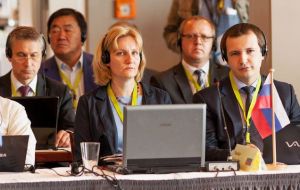MercoPress. South Atlantic News Agency
Fears that proposal for MPA in the Ross Sea will again succumb at CCAMLR
 Last July the initiative failed after Russia and Ukraine questioned whether CCAMLR had the authority to establish a marine reserve
Last July the initiative failed after Russia and Ukraine questioned whether CCAMLR had the authority to establish a marine reserve The world's biggest marine reserve in Antarctica may have to be given an expiry date to get countries with interests in the prized waters to agree to it. Delegations from 25 nations are resuming in Tasmania a New Zealand-US proposal for a marine protected area (MPA) in the fish-rich Ross Sea, 3500km south of New Zealand.
The proposed reserve has been scaled back from 2.27 million sq km to 1.34 million sq km after a consensus could not be found at a special meeting of the Commission for the Conservation of Antarctic Marine Living Resources (CCAMLR) in Germany in July.
At that meeting, nations including Japan and Norway expressed concern about the permanence of a marine reserve in the Ross Sea.
New Zealand's proposal now included a 50-year “sunset clause”, which meant the reserve could be revised or scrapped if countries felt it was not working. New Zealand officials said there was a wide range of views on a cut-off date - some countries felt 50 years was too long, while others wanted the MPA to last forever.
Antarctic Ocean Alliance co-coordinator Geoff Keey said that like National Parks, marine reserves should be permanent: “There's always the risk that some countries will try to make it more of a temporary closure.” But he added if the revised proposal got over the line, it would be difficult to dismantle it because any changes required a 25-nation consensus.
The talks inJuly failed after Russia and Ukraine questioned whether CCAMLR had the authority to establish a marine reserve. The two countries were believed to have dropped that line of argument, but both nations remained concerned the proposal could affect their fishing interests in the region.
The failure to get a consensus was a hugely disappointing outcome for the New Zealand and US delegations because the meeting had been called especially to discuss the MPA proposals and had been preceded by eight months of furious lobbying.
The discussions over the proposed reserve have dragged on for two years and the policy has been worked on for eight years. A decision on the reserve was expected on November 1.
Meanwhile support for the initiative was stated in a simultaneous release from Australia, the European Union, France, New Zealand and the United States. The group of countries call for the establishment this year of marine protected areas (MPAs) in the Southern Ocean, in the Ross Sea Region and in East Antarctica.
“The establishment of such MPAs follows through on the vision expressed by all nations at the World Summit on Sustainable Development in Johannesburg in 2002 and the Rio+20 conference in 2012.
”Since 2005, the Commission for the Conservation of Antarctic Marine Living Resources (the Commission, CCAMLR) has worked to complete the necessary groundwork for the designation of MPAs in CCAMLR, including the establishment of a legal framework agreed by all Members and extensive scientific research.
“The Ross Sea and East Antarctica regions are widely recognized for their remarkable ecological and scientific importance. The MPA proposals now before the Commission are based on sound and best available science, will provide a unique laboratory for continuation of marine research, and will have profound and lasting benefits for ocean conservation, including sustainable use of its resources.
”We call on all Members of the Commission to bring years of preparation to a successful conclusion by establishing these important, science-based MPAs at the next session of the Commission in October 2013 in Hobart, Australia”.
The release is signed by Julie Bishop MP, Minister for Foreign Affairs, Australia; Laurent Fabius, Minister of Foreign Affairs, France; Murray McCully, Minister of Foreign Affairs, New Zealand; John Kerry, Secretary of State, United States and Maria Damanaki, Commissioner for Maritime Affairs and Fisheries on behalf of the European Union.




Top Comments
Disclaimer & comment rulesCommenting for this story is now closed.
If you have a Facebook account, become a fan and comment on our Facebook Page!